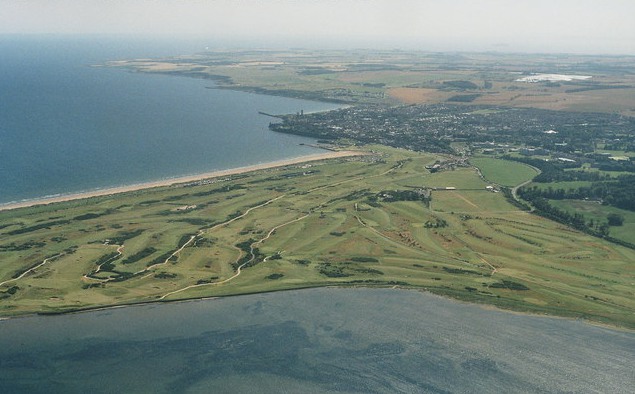All of the UK’s links golf courses could disappear by 2100
An alarming report from the UK’s leading environmental organisation charity has found that every links golf course in the UK is in danger of disappearing in less than a century due to climate change.
The Climate Coalition says golf faces an ‘unexpected threat’ from even a slight rise in sea levels, and Open Championship venues such as St Andrews and Royal Troon could be under water by 2100.
The report, which adds that six of the UK’s seven wettest years on record have occurred since 2000, predicts that “golf courses will crumble into the sea”.
“Climate change is already impacting our ability to play and watch the sports we love,” said the report, adding that extreme weather is a factor in declining participation and lost revenue.

Last year we reported on the 455-year-old Montrose Golf Links, which was investigating the possibility of a crowdfunding campaign to raise £5 million to install rock armour alongside three of its seaside holes, following 25 years of coastal erosion.
Montrose Links to crowdfund for £5m to stop course falling into the sea
Chris Curnin, director at Montrose Golf Links, said: “As the sea rises and the coast falls away, we’re left with nowhere to go. Climate change is often seen as tomorrow’s problem – but it’s already eating away at our course.
“In a perfect storm we could lose five to 10 metres over just a couple of days and that could happen at pretty much any point.”
There was as much as 20 per cent less playing time for courses across the greater Glasgow area in 2016-17 compared to 10 years earlier, the report suggests.
“These findings should cause great concern among golf’s authorities,” said BBC golf correspondent Iain Carter.
“The game was founded on the links turf of the British seaside and provides golf in its most authentic form – as well as sums in excess of £75m to local economies on an annual basis.
“But the sport has recognised its precarious position at the hands of mother nature, with a number of green initiatives adopted in recent years.
“This report might also impact on discussions aimed at limiting driving distances because it highlights potential dangers in the maintaining the current trend of lengthening golf courses.”
“It is a fact that increased rainfall and extreme events are causing more disruption in recreational golf,” added Richard Windows of the STRI.
One in six Scottish golf courses are on the coast, where they are at the most risk of erosion due to rising sea levels, added the report.
Steve Isaac, director of golf course management at the R&A, said: “There is no question it is becoming a huge factor.
“I believe golf is more impacted by climate change than any other sport aside from skiing.
“We are feeling it now with increases in unplayable holes, winter course closures and disruption to professional tournaments.
“And the future threats are very real.”

Professor Piers Forster, director of the Priestley International Centre for Climate at the University of Leeds, added: “Climate change is already affecting the historic game of golf in its birthplace.
“Without cutting the carbon emissions driving climate change, sea levels will rise by over a metre and extremely wet winters will become the norm,” he warned.
“Many aspects of our lives including the game of golf would struggle to adapt to such a changed world.”
The Climate Coalition, which is made up of groups ranging from the National Trust and the Women’s Institute to WWF, the RSPB, Greenpeace and Oxfam, is releasing the report as part of its ‘Show The Love’ campaign, which celebrates things people love but that could be lost due to climate change.















All these experts going on about climate change – none of their predictions over the last 50 years have come true!
This was a wonderful read, keep up the good work
Dear Alistair,
As editor, may I ask; are you aware that your article is spreading unnecessary alarm about sea level rise because of man-made global warming?
There are many reasons for the total 0.8 degree of global warming in the last 100 years, and it has had little effect on sea-levels.
It is clear that seaside golf clubs should take action against erosion, just as Brancaster and Dornoch relatively recently have done and as Peterhead (see FineGolf’s comment in the recent review) did in the 1960s before the belief system of Anthropogenic Global Warming (AGW) was invented.
Are you aware that in contrast to some other coastal courses that are being threatened with erosion by storms, particularly at high spring tides, Burnham & Berrow and Rye have both new nine-hole courses on land reclaimed from the receding sea?
Another issue that could affect the relationship with the sea for links-style running-golf courses in Britain is the geological tilting that has occurred gradually since the last ice age of 20,000 years ago, a tilting which has nothing to do with AGW. A research report in 2009 suggested Scotland might rise by as much as 10cms while south England drop by 5cms over the next century. https://www.telegraph.co.uk/news/earth/earthnews/6226537/England-is-sinking-while-Scotland-rises-above-sea-levels-according-to-new-study.html
Following their series of embarrassingly incorrect seasonal forecasts, which they have now stopped giving, the Met Office now gives any storm a name, which influences the public’s recollection of ‘weather’ events as worse than normal and thereby helps mix up ‘weather’ and ‘climate change’ in the public’s mind.
You quote a number of well-intentioned people talking about the anecdotal effects as they see it of extreme weather events that are called ‘climate change’, nevertheless even the IPCC (the body set-up within the UN by the alarmists to advise governments and that organised Kyoto, Copenhagen and the Paris Accord) concluded in 2013 that there was ‘high agreement’ that ‘long term trends’ in extreme weather events could not be attributed to natural or anthropogenic climate change. (See page 56 and note 65 of the Groupthink report mentioned).
This detail can be seen through the link to the downloadable pdf of the report given on the following GWPF page https://www.thegwpf.com/new-study-climate-groupthink-leads-to-a-dead-end/ where there is also a short video giving an introduction as to how groupthink has captured the science of climate change.
Nevertheless, I think you will agree that the whole slant of your article is to accept without question the highly controversial alarmist summary statement by the academic Piers Forster: “Without cutting the carbon emissions driving climate change, sea levels will rise by over a metre…..”
May I suggest that your magazine’s content would be believed by more people should it show some balance in this complex argument and it would be better to display some objectivity and also quote the world’s foremost experienced, expert scientist on sea-level-rise. https://www.thegwpf.com/nils-axel-morner-these-researchers-have-a-political-agenda a recent interview published on the 18th of February 2018.
One quote from the interview with Nils-Axel Mörner which I would cite is: “The doomsday scenarios usually refer to the year 2100. I estimate that the sea level will by then rise by five centimetres on average, with an uncertainty of 15 centimetres. The change might go from plus 20 centimetres to minus 10 centimetres. This is not a threat. Anyone who claims that there will be a threat of an increase of one meter or so has no idea of physics.”
Would it not be more advisable to balance the forecasted alarmism, promulgated by those who have a belief in AGW, with the facts that put the truth into the correct balanced context?
I’ve personally witnessed the erosion at St. Andrews after 24 years of escorting groups. Maybe Doonbeg gets flooded and we get back into the Paris Climate Pack.
Climate predictions come in two types, those that failed to materialise and those that are yet to fail to materialise. So much fun.
A jolting piece Alistair and a sobering thought for the future of links golf. I was at Montrose last week and had a look over the cliff on No. 2 and understand the problem with the erosion. Thank you for sending this story along.